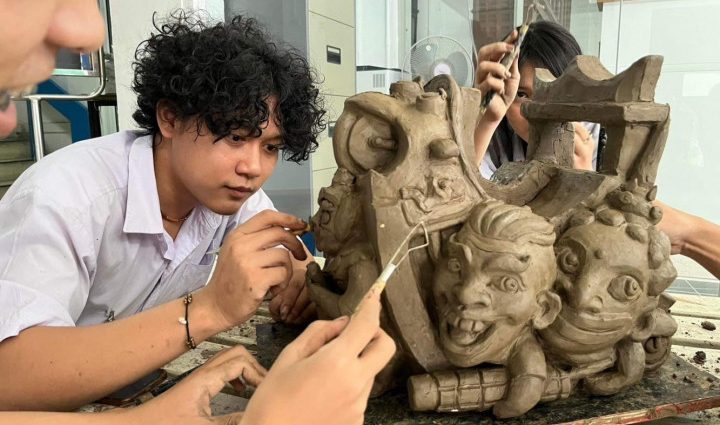Thai team beats the odds to claim first prize in international snow sculpture competition

Using clay, cement and ice to sculpt “snow art”, a Thai team from Saowabha Vocational College in Bangkok won the first prize in the 16th International Collegiate Snow Sculpture Contest hosted in Harbin, Heilongjiang Province, China.
“We had only three weeks to prepare for the competition. Our fine arts students worked hard. They practised sculpturing from 8am to 10pm every day, and only took two short meal breaks,” said Sornchai Chanasuk, the team coach.
From Jan 4–7, three teams of Thai students competed at the 16th International Collegiate Snow Sculpture Contest in Harbin.
The competition was hosted by Harbin Engineering University and Harbin International Ice and Snow Festival. It was joined by 57 college student teams from seven countries: Australia, Belarus, China, Italy, Russia, Thailand and the United Kingdom.
The work that won the first prize was Tuk Tuk on Tour, by a team of four students from Saowabha Vocational College. They were Aongsa Yutthasard, Kawin Sattapak, Sudakan Jardkaew and Natthawut Saengphu, coached by their teacher, Mr Sornchai.
Thailand was the only tropical nation in the competition that did not have snow. But it was not an obstacle because the team could use substitutes.
“I divided up our practice into two rounds. In the first round, the team practised by sculpting clay. In the second round, we used cement to practice,” he said.
“Before we left for China, we had one final round of practice. This time, we used ice cubes to make sure we were confident with the tools we had.”
In the first iteration, a clay model of Tuk Tuk On Tour which the students sculpted was nowhere near the size of the piece they created in Harbin, measuring only about 40 centimetres; the real size was almost double in height.
“One of the biggest challenges was the cold. The team had to wear gloves during the competition because it was just so cold there. That made it harder for us to work with tools,” Mr Sornchai said.
The students had never participated in an international competition of this scale before. “This was the first time, and we had very little time to practice before the competition,” he said.
The final piece included mythical characters and characters based on Thai culture on the tuk-tuk, an iconic three-wheeled vehicle that roams the streets of Bangkok and beyond.
When asked about the inspiration for the work, Mr Sornchai said the theme of the competition was culture and tradition.
“I told the students they should gather some of Thailand’s most iconic ones, and showcase those at the competition. The students sketched their ideas, and we refined them until we arrived on ‘Tuk Tuk On Tour’.
“So, in terms of inspiration, we just wanted to show them our beautiful culture.”
An example of contemporary Thai art, merging elements of modern culture with traditional elements, the sculpture captivated viewers and judges alike.
It made traditional Thai art and culture more accessible to those who may not be familiar with it, while also displaying elements of everyday life in Thailand.
Two other Thai teams, from Surat Thani Vocational Education College and Saraburi Vocational Education College, both won a third prize with their works Humans and Nature and World of Peace respectively.
Surat Thani Vocational Education College previously won first prize in the 13th International Collegiate Snow Sculpture Contest in 2021.
Their Humans and Nature sculpture this year highlighted the impact of human progress and advancements in technology on the environment and the natural world.
The Saraburi Vocational Education College team’s work, World of Peace, aimed to remind people how detrimental violence is to the world, and that peace is an important part of human culture.

